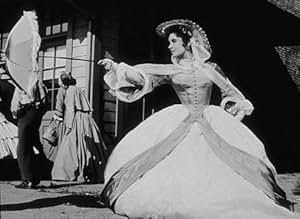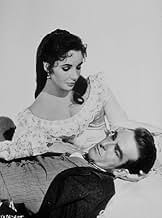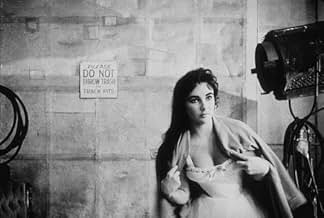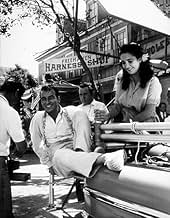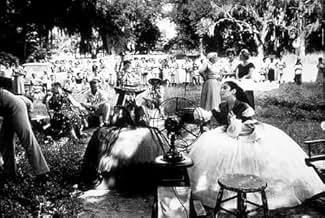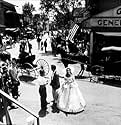अपनी भाषा में प्लॉट जोड़ेंA student falls in love with a Southern belle, but their relationship is complicated by her troubled past and the onset of the Civil War.A student falls in love with a Southern belle, but their relationship is complicated by her troubled past and the onset of the Civil War.A student falls in love with a Southern belle, but their relationship is complicated by her troubled past and the onset of the Civil War.
- निर्देशक
- लेखक
- स्टार
- 4 ऑस्कर के लिए नामांकित
- 1 जीत और कुल 8 नामांकन
- Townsman
- (बिना क्रेडिट के)
- Parthenia
- (बिना क्रेडिट के)
- Townsman
- (बिना क्रेडिट के)
- Jake - Bartender
- (बिना क्रेडिट के)
- Spectator
- (बिना क्रेडिट के)
फ़ीचर्ड समीक्षाएं
I saw "Raintree County" when I was 15. Orphaned at six, I'd just departed from an orphans home in Dallas, after nearly nine years. Knowing virtually nothing of the outside world, I was receptive to everything, every person that I encountered. That summer of 1958, I sneaked into the Forest Park Drive-In to see Elizabeth Taylor, of whom I knew little, other than that she was a breath-taking beauty, and had been recently widowed when Michael Todd's chartered plane had crashed.
The characters in the movie (when I was 15) were literal, if not visceral: the magnificence of Miss Taylor's satin gowns encased over crinoline, Lee Marvin's sharp, smart-alecky wit, the professor's lechery, Montgomery Clift's Yankee stoicism, Agnes Moorehead's curious detachment, were all primary colors.
Forty-five years have passed. Those primary colors are now a multitude of blendings and shadings of secondary colors. Montgomery Clift's character is now a beautifully controlled young man who reflects his parents' stoicism, a young man whose intelligence and self control are at the core of the film, and upon whom all characters revolve.
Originally, I thought that "Raintree County" was strictly Taylor's vehicle. She is the burr under the saddle, the exquisite seductress that interfers with Clift's heretofore regulated, almost predestined lifestyle upon his college graduation.
'Raintree' is an achingly beautiful film, and Miss Taylor, who is the most gifted in her portrayal of anguished characters, blesses the movie. Norma Shearer could be beautiful in 'Marie Antoinette", but she lacked depth. Betty Davis portrayed Sturm und Drang, but was never a clothes horse. Taylor combines the two.
Having read some of the other's comments, most of whom disliked the story, perhaps it helps to be Southern to truly love this film. And also, one wants to realize that it depicts two diametrically opposed cultures: North and South. When Northern chill mixes with Southern humidity, chaos results. And so it did, and it was known as The War Between the States.
In conclusion, one wants to luxuriate in this film: Lockridge wrote a brilliant story, and for the most part, it is well delivered. It is rich in history and characterization.
Elizabeth Taylor is about the only central player who emerges relatively unscathed and her Academy Award nomination was deserved (and certainly more worthy of the Oscar she did win for "BUtterfield 8".)
I bought reserved seat tickets for this before its initial engagement began and the reviewers' generally negative appraisals were available. M-G-M's new big screen process, MGM Camera 65 ("Window of the World" as they termed it, used only once again by the studio for "Ben-Hur"), afforded a handsome showcasing of all the expense lavished upon this production, but, even as a teenager, I squirmed in my seat as its oh-so-lengthy reels unspooled and I left the theater regretting that its makers hadn't somehow achieved something memorable for its quality and dramatic impact, rather than for its longueurs. Johnny Green's score (and Nat King Cole's rendition of the title song) did sound awfully good over the stereophonic sound system at that Beverly Hills, California theater and that's one aspect of this disappointment that is now probably lost forever.
But dark Elizabeth is Veronica to Saint's blond Betty. Or is it the other way around? No matter. Anyway they have contrasting personalities: the intensely passionate Taylor and the winsome and innocent Saint. Saint, for instance, would never dream of putting out for handsome, intelligent, and sensitive Monty, whereas Taylor does so on their second or third date and then LIES to him about having gotten pregnant. He doesn't mind one way or the other, besotted as he is.
I don't know whether it's worthwhile trying to get through the plot. It's probably been done elsewhere, and I'm too tired to trace the trips, the outbursts of anger and guilt, Sherman's march through Georgia, and the finale, which no power on earth could force me to reveal. Much of it has to do with the fear of having a touch of the tar brush in one's blood.
But I must say, New Orleans is given rather a bad rap as a representative Southern city. It wasn't like any of the others. It had an animated and rich multi-ethnic heritage at the time -- American, French, Spanish, Caribbean, and African. Edgar Degas visited French relatives there late in the '19th century. Slaves of course but not nearly as brutal a system as elsewhere. William Tecumseh Sherman taught at Louisiana State Seminary of Learning & Military Academy, later to become Louisiana State University.
Others have claimed that it was easy to tell the difference between pre- and post-accident scenes of Montgomery Clift but I couldn't. As for the accident, Clift was doing booze and other substances to excess on a daily basis during the shooting. I mean, eating steaks he'd spilled on the floor and so on. After an evening at Liz Taylor's manse perched on a hill, he drove drunkenly down the winding road and didn't quite make it.
Neither the accident nor the booze seemed to interfere with his acting, although the part of the pathetic loner in "A Place in the Sun" suited him better than the idealist he's forced to portray here. Elizabeth Taylor is blindingly beautiful. Many of her films cast her has a frustrated nut job. Eva Marie Saint has the more sympathetic role as the unspectacular girl from home who never manages to shrug off her love for Clift.
It's long. It has an overture and even an entr'acte, evocative photography by Robert Surtees, and a lushly orchestrated but fulsome score by Johnny Green. It's no "Gone With the Wind," though, partly because it substitutes anguish for laughs.
Trapping him into marriage with the lie that she's pregnant, and then proceeding to lose her hold on her sanity, Susanna detains the good and helpless John for eight years He is released, able to return to his magnificent dream and to his pure childhood sweetheart, only after tragic events
Retaining the essence of Ross Lockridge, Jr. best-seller, the movie states the equality of the unhappy romance with the Civil War: the personal drama is therefore a reflection of the nation's wounds According to the top-heavy symbolism, Susanna Drake represents the South, corrupting and dragging down the North; she's the Body contaminating the poet's Soul
Taylor plays Susanna Drake's character with an intensity that exceeds all her earlier work Montgomery Clift as the unlucky poet and Eva Marie Saint as his high school sweetheart and true love are on the remote side, but the scenes with Liz strike fire in a wonderfully brilliant way
With its battles and its formal balls, its magnificent riverboats and decayed mansions, its bordellos and madhouses, its childbirth and deathbed scenes, and its evacuation of Atlanta, Edward Dmytryk's "Raintree County," like its source, has undeniable epic dimension
Clearly, MGM was hoping for something approaching "Gone with the Wind" - and, they failed. However, "Raintree County" is not so bad, when viewed without the comparative eye. The big budget production values are beautiful; the obvious expense, and the cast, helps maintain interest in the relatively weak storyline. And, it does get better, as the starring triad (Clift, Taylor, and Saint) slowly draw you into their lives. Viewing will require some degree of commitment, though; it's a long movie.
Early in the filming, Clift left a visit with friends at Taylor's home, and drove his car into a telephone pole. He nearly died, and his facial "reconstruction" is obvious throughout most of "Raintree County". Clift's performance is uneven, also - but, he was too good an actor to be completely derailed. And, Clift is better than you might have heard. Also, he, does not look as bad as many have claimed. The eventual toll on his "looks" was mainly taken by a growing dependence on alcohol and painkillers.
Taylor, who is credited with saving Clift's life, shows some of the sparkle that would quickly make her one of the best actresses in the business, especially during the film's second half. Nigel Patrick, Lee Marvin, Rod Taylor, and Agnes Moorehead head up a strong supporting cast. Robert Surtees' savory cinematography is noteworthy. And, Nat King Cole sings the Johnny Green title song, a minor hit, very sweetly.
****** Raintree County (10/4/57) Edward Dmytryk ~ Montgomery Clift, Elizabeth Taylor, Eva Marie Saint
क्या आपको पता है
- ट्रिवियाThe scenes which Montgomery Clift shot for this movie just before his accident represent the only color footage available of him before he was disfigured. All of his previous movies had been shot in black-and-white.
- गूफ़After Abraham Lincoln's 1860 election, the crowd sings "The Battle Hymn of the Republic". However, Julia Ward Howe wrote the poem on which the song was based for the Atlantic Monthly in 1861.
- भाव
Susanna Drake: That 4th of July race... what happens when you win?
John Wickliff Shawnessy: Well, according to a friend of mine, if I win, a beautiful girl will place a garland of oak leaves on my sun-colored locks.
Susanna Drake: I'd like to be that girl.
John Wickliff Shawnessy: Maybe it can be arranged?
Susanna Drake: Oh, it can be arranged, all right. *I'll* arrange it.
- इसके अलावा अन्य वर्जनThe longer Roadshow version was released on VHS by Warner, where it was labeled as Reconstructed Original Version. It has also been shown on Turner Classic Movies cable channel. This version contains nearly 15 minutes of additional material not found on the General Release Version.
- कनेक्शनEdited from गॉन विथ द विंड (1939)
- साउंडट्रैकRaintree County
Music by Johnny Green (uncredited)
Lyrics by Paul Francis Webster
Sung by Nat 'King' Cole
टॉप पसंद
विवरण
बॉक्स ऑफ़िस
- बजट
- $50,00,000(अनुमानित)
- दुनिया भर में सकल
- $6,543
- चलने की अवधि3 घंटे 2 मिनट
इस पेज में योगदान दें



